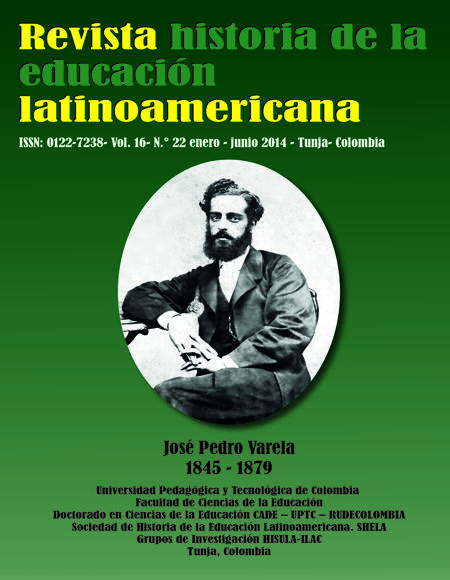Latin American Universities: Between Tradition and Future

Abstract
This essay argues that contemporary Latin American universities need to assume the task of helping to reconstruct the ethical and political background of societies whose viability is in question due to the corruption, violence, and exclusion that have affected them throughout history. Part of this mission consists in reflecting upon their societies’ socio-cultural backgrounds, in order not only to recognize their positive aspects, but also to question those political philosophical models that, responding to other contexts, have been mechanically imposed in the region. This task is illustrated with a reflection upon the political philosophy developed by Guatemalan ex-president Juan José Arévalo, an educator and philosopher who governed Guatemala from 1945 to 1950.
Keywords
Journal, History of Latin American Education, university, inequality, ethics, culture
Author Biography
Jorge Mario Rodríguez-Martínez
Doctor en filosofía (Ph. D) York University. Licenciado en filosofía, Universidad de San Carlos de Guatemala (USAC., Maestro en filosofía en Ohio University, Catedrático de la Escuela de Posgrado en Derecho de la USAC, Director del Instituto de Investigaciones de la Escuela de Posgrado en Derecho del Centro Universitario de Occidente de la USAC.
References
- Abellán, José Luis. “Introducción”. En El krausismo y la Institución Libre de Enseñanza, editado por A. Jiménez García. Madrid: Cincel, 1985.
- Brading, David. The Origins of Mexican Nationalism. Cambridge: Cambridge University Press, 1985.
- Carbonell, Miguel y Rodolfo Vázquez. Rodolfo. Poder, derecho y corrupción. México, D.F.: Siglo XXI, 2003.
- Cruz, Manuel. Acerca de la dificultad de vivir juntos: La prioridad de la política sobre la historia. Barcelona: Gedisa, 2007.
- Drake, Paul W. Between Tyranny and Anarchy: A History of Democracy in Latin America, 1800-2006. Stanford: Stanford University Press, 2009.
- Desmond Arias, Enrique y Daniel M. Goldstein. Violent Democracies of Latin America, Durham NC: Duke University Press, 2010.
- Echeverría, Bolívar. La modernidad de lo barroco. Segunda edición. México D.F.: Ediciones Era, 2010.
- Eguiara y Eguren, Juan José. Prólogos a la biblioteca mexicana. Segunda edición en español. México, D. F.: Fondo de Cultura Económica. 1984.
- Fee, Nancy H. “Biographical Essay”. En Virtues of the Indian/Virtudes del Indio. Libro de Juan de Palafox y Mendoza, editado y anotado por Nancy H. Fee. Lahham, Maryland: Rowman & Littlefield, 2009.
- Fernández Santamaría, J. A. Natural Law, Constitutionalism, Reason of State and War. Counter Reformation Spanish Political Thought, Volume I. New York: Peter Lang Publishing, 2005
- Hoyos Vásquez, Guillermo. “Filosofía latinoamericana significa uso ético de la razón práctica”. Vol. 19 (1998): 79-96.
- León-Portilla, Ascensión y Miguel León Portilla. Las primeras gramáticas del Nuevo Mundo. México, D.F.: Fondo de Cultura Económica, 2009.
- Levinas, Emmanuel. Totalidad e infinito: Ensayo sobre la exterioridad. Traducción de Daniel Guillot. Salamanca: Sígueme, 2006.
- Marsike, Renate. “Historia de la Universidad de México” RHELA, No. 8 (2006):.
- Mata Gavidia, José. Fundación de la Universidad en Gutemala 1548-1688. Ciudad de Guatemala: Editorial Universitaria, 1954.
- Ortega y Gasset, José. Meditaciones del Quijote. Séptima edición. Madrid: Cátedra, 2007.
- Pereña, Luciano. La Escuela de Salamanca: Proceso a la conquista de América. Salamanca: Caja de Ahorros y Monte de Piedad de Salamanca, 1986.
- Rawls, John. A Theory of Justice. Edición revisada. Cambridge, Massachusetts: Harvard University Press, 1999.
- Salord Beltrán, Manuel Ma. La influencia de Francisco de Vitoria en el derecho indiano. México, D.F.: Porrúa, 2002.
- Stoetzer, Carlos. (1996): “Krausean philosophy as a Major Political and Social Force in the Modern Argentina and Guatemala,” en Bridging the Atlantic: Towards a Reassessment of Iberian and Latin American Cultural Ties, Marina Pérez de Mendieta (ed.). New York, State University of New York Press.
- Tierney, Brian. The Idea of Natural Rights: Studies on Natural Rights, Natural Law, and Church Law 1150-1625. Grand Rapids, Michigan: William B. Eerdmans Publishing Company, 1997.
- United Nations Development Programme. Democracy in Latin America: Towards a Citizen’s Democracy. New York: United Nations Development Programme, 2004.
- Velasco Gómez, Ambrosio. Republicanismo y multiculturalismo. México, D.F.: Siglo XXI, 2006.
- Villoro, Luis. Estado Plural, Pluralidad de Culturas. México, D.F.: Paidós, 1998.
- Villoro, Luis. Tres retos de la sociedad por venir: Justicia, Democracia, Pluralidad. México, D.F.: Siglo XXI, 2009.
- Young, Iris Marion. Political Responsibility and Structural Injustice. Kansas City: Departamento de Filosofía, Universidad de Kansas. 2001.
- Zavala, Silvio. Por la senda hispana de la libertad. Segunda edición. México, D.F.: Fondo de Cultura Económica, 1993.